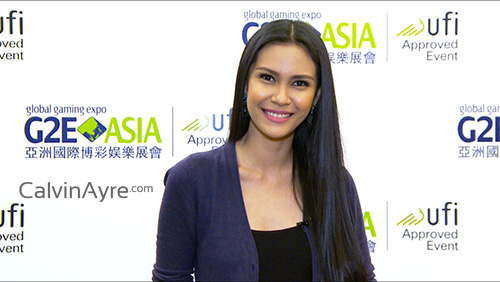Day Two of G2E Asia is complete. The number of attendees visiting the conference floor was much larger than the first day as the floor was abuzz with activity.
The first session of the day continued the previous days discussions about how integrated resorts can continue to diversify their product offering in order to increase their revenues away from the gaming tables. The speakers talked about how nightclubs, spas, shopping and acting as a destination for Asian conferences will all help with the diversification.
There was another session on slots and electronic table games but we were on the conference floor exploring the booths during this one.
In the first session of the afternoon, moderator Andrew Klebanow of Gaming Market Advisors had a discussion with Anita Cheung of Tak Chung Group and Kevin Clayton, the CMO of Galaxy Entertainment group about mass marketing, reaching their target markets.
Clayton talked about the rise in the Chinese middle class which is expected to double in the next decade and increase the rewards club revenues in excess of $60b from those VIP gamblers. He talked about the importance of using other avenues to advertise their resorts inside China as any mention of casinos or gaming is prohibited. He said the market will see an increase in celebrity endorsements and bringing big events to the Cotai arena as the Sands did with the Rolling Stones back in March.
He said the Chinese customer is very brand conscious and when they become a fan of your brand, they become your biggest advocates. This branding also carries over to their employees, as the best talent wants to have the best brands on their resumes.
Cheung talked about the VIP junket market. She said word of mouth marketing is still very effective. They focus on building personal relationships with their players and they can offer access to many resorts not just one or two like the casinos.
With the Cotai Strip building massive complexes, the question was raised about the continued viability of the older casinos on the peninsula. Clayton answered that the peninsula is getting its second wind. The more discerning customer is moving back to the peninsula from the Cotai Strip as the casinos in the peninsula have minimal staff turnover, well defined services and many of the large customers have years of familiarity to the point where the staff know their names and they know the staff.
After the marketing talk, the discussions turned to the current regulatory landscapes in Asia. Martin Williams of Gambling Compliance and Andrew Zarnett of Deutsche Bank shared their opinions with David Green of Newpage Consulting.
Green opened by asking Zarnett about the current “arms race” going on with billions on billions being spent building resorts and asking how long can it last?
Zarnett is confident that there are still significant investment opportunities; he’s predicting that the Macau will have revenues topping $100b by 2021. He talked about the unfulfilled demand and said that if thereweren’t going to be continued growth, China wouldn’t be building up the infrastructure, such as the bridge between Hong Kong and Macau.
Both Williams and Zarnett shared their opinions on Japan; neither was convinced that they would be operational before the Olympics. Martin lamented that it probably time for the resorts to focus on a job well done than a job done quickly.
One of the key factors that will delay the projects, even if the casino legislation is passed, is a labor shortage to build the resorts. Most of the labor is already busy preparing for the Olympics or rebuilding Eastern Japan that was destroyed by the Fukishima earthquake three years ago.
When asked about the potentially high tax rates in Japan, Zarnett said that Macau’s high tax rate hasn’t hurt business so Japan should be able thrive.
The question was raised if Japan comes online will it hurt Macau. Zarnett said that the customers coming to Macau are not from Japan and the Chinese customers are still primarily from the southern regions of country.
Taiwan was brought up and Williams, a Taiwan resident said he was once convinced that “Taiwan and Japan were a race to see who could be last” but suggested recent events gave him hope the Taiwanese government would get something done soon as most of the contentious issues have been resolved. The opposition party has requested some outrageous demands, but Williams feels those demands are just bargaining chips for items that are far more reasonable.
One number that stood out today was 1.5-2.8%. That is the estimated market penetration Macau has in the potential Chinese gaming market. To put that in perspective, Las Vegas has close to 68% market penetration of the US gaming market. It would take Macau another 30 years to reach that sort of percentage so the revenues will continue to rise in the former Portuguese enclave.
Our recap was a little shorter today, but tomorrow G2E Asia will turn its attention to online gambling so we expect a busy day of sessions on Thursday.






